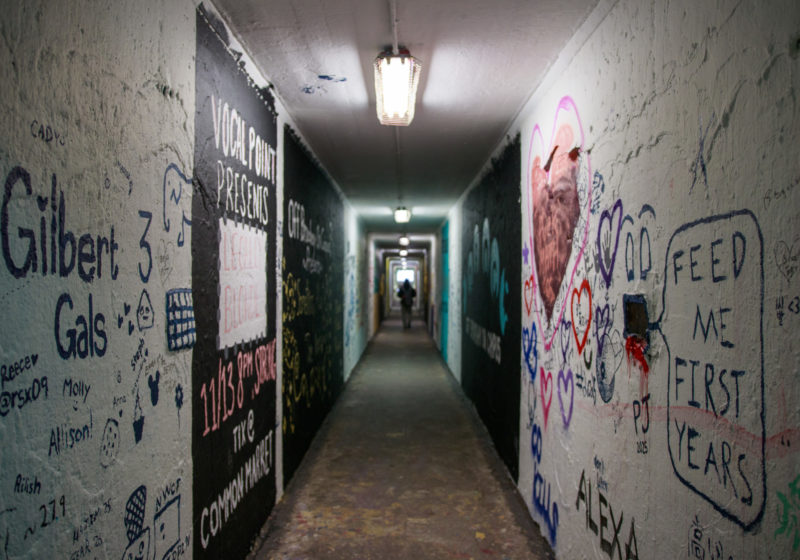The third iteration of UR confessions pages has been guillotined. And, as with its predecessors, the second law of thermodynamics came into play: The universe only gets messier as time goes on.
College confession pages have had a tight grip on the college experience for decades, from their humble beginnings as Mean-Girl-esque Burn Books, to 2000s Anonymous Blog Pages, to the current Instagram-Twitter masquerades. There are a lot of secrets that cycle through a campus, and the best part of secrets is sharing them. These forums offer a huge audience to do just that.
Not unlike a regal monarch, the administration of @UR_SecretSafe, whoever they were, met their match when it came to the backlash of the proletariat. Their aims were noble, to a degree; after the death of UR Confessions, they vowed to post anything and everything students had to say, no matter their own personal stances. With that, though, came the consequences of angry comments sections and the need to continuously back the importance of giving a platform to problematic posts. So, off with their head, just like the one before them and the one before them.
Inevitably, any anonymous forum is a supernova waiting to happen. They come into our field of vision, bright and full of vigor, but they burn with such a fury that they are soon snuffed out.
As noted, this is not the first time one of UR’s anonymous forums has temporarily bit the dust or shifted to a separate platform. The initial “confessions page” could be considered the painted tunnels, which are known for being a (more or less) safe haven for student expression. An unsanctioned and uncensored version, which is more akin to what we know today, could be the writing in the Morey bathrooms. Online confession accounts for UR students started on Facebook (one notable example is still running, but it’s nothing like it was in its heyday) and have since shifted to Instagram.
Then in 2015, offensive and threatening posts to the YikYak app led to campus outrage and even subpoenas. It was recommended that the app be banned from campus, but ultimately this was decided against. UR’s battle with YikYak gained the attention of FIRE, the Foundation for Individual Rights in Education. According to a University communication post-outrage, banning the app from UR’s Internet would be “ineffectual and counterproductive,” and would likely remove UR’s ability to get future hateful posts taken down.
With these controversies in mind, we here at the Campus Times have a list of guidelines that you may want to take into account before you post.
Dos and Don’ts of Anonymous Confession Posts
Do:
- Write posts protecting the anonymity of both yourself and any potential subjects.
- Write posts that you wouldn’t be ashamed to have associated with your name.
- Submit posts about how hot YOU are (it’s self love, folks).
- Re-read and take a minute to think about your confession before actively choosing to post.
Don’t:
- Write something that can harm someone, unintentionally or intentionally.
- Write love confessions that may embarrass the person in question or make them feel uncomfortable or unsafe.
- Use the confessions page as a place to broadcast opinions that are too “edgy” (read: blatantly offensive) for real life. You’re an adult. Own your beliefs.
Let’s be clear: The act of posting anonymous confessions is valid. It’s valid to have our opinions voiced without dilution or restraint. It’s valid to want to be able to express yourself without fear of censorship or threats. But what’s not okay is using an anonymous platform to broadcast hurtful things you would never say if your name or face were attached. The internet is not your close friend or a confidant; the second you choose to confess, your sins are immediately validated in the eyes of others as conversation material. When’s the last time you talked to a friend about something raunchy you saw on SecretSafe? Anonymous slander towards others, warranted as you may think it is, is not safe for our student body.
But this cycle of confession pages spawning — and their timely deaths — is inevitable anyway. After all, SecretSafe itself only lasted a couple of months, from around the start of the 2021-2022 school year after the end of UR Confessions (which itself only lasted for a little over a year). The newest version, @URSecret_Safe, was created in the middle of this week’s production of the Campus Times. We can’t stop confession slander, nor can we prevent it from escalating. And even if we could, we can’t deny that a spicy dispute is more than enough reasons why we’re still hanging around the page.
Our best bet is to embrace it, to reconcile with our voracious appetites for gossip, and to accept that people will continue to shitpost until the forums are dismantled once again. There’s no stopping it, so why not just enjoy the ride (while avoiding a defamation lawsuit)?
The Editorial Board is a weekly Opinions article representing the view of the Campus Times, co-written by Editor-in-Chief Corey Miller-Williams, Publisher Megan Browne, Managing Editors Melanie Earle and Alyssa Koh, News Editor Henry Litsky, and Opinions Editor Allie Tay.



